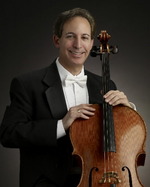
CC.com: Cellists seem to be a lot more gregarious than other instrumentalists. They form societies, they hang out together and support each other, they schedule events where they play works for multiple cellos, etc. Do you have any insights as to why cellists are more likely to behave this way than, say, violinists or oboists?
Richard Weiss: Possibly because the cellist population is about 1/2 in number compared to violinists, yet 3 times more than oboists (consider orchestra sections), we feel neither lost in the crowd nor like loners — perfect for bonding. As the joke goes, “Question: How many violinists does it take to screw in a light bulb? / Answer: Four… one to actually do it, and 3 more to say they could do it better!” Cellists are generally less competitive and open to working together. We also like to exploit the wide range of the cello by playing in choirs without the assistance of violin or viola. (Viola societies are increasingly popular for bonding but they lack the lower range for a bass line…)
CC.com: What role does the Cleveland Cello Society play in encouraging young, up-and-coming players?
RW: Many members of the CCS are teachers as well as performers and share a desire to give their students exposure to other cellists and alternative styles of performing, for example, improvisation as taught by Eugene Friessen and others we have sponsored to do workshops in Cleveland. Also, while I joke that cellists are not as competitive as violinists, we do encourage competition which gives our students the incentive to keep refining their skills. That is the reason we sponsor an annual competition for all grade levels.
CC.com: What’s one thing you’d like to see the Society do that it hasn’t yet gotten around to doing?
RW: CCS has a long list of accomplishments in terms of recitals and master classes given by notable cellists, which Ida Mercer can immediately produce upon request! One brainstorm our committee recently came up with involves a mystery hunt/car rally with all cello-related waypoints. The only thing holding us back is finding the perfect Cleveland weather day, and safety planning so that our more competitive cellists aren’t tempted to break traffic laws in search of the “holy grail” of cellodom. My personal whim is to attempt a Guiness Book world record by scheduling the most cellists ever travelling with their instruments in the seat next to them on the same flight out of Cleveland Hopkins airport…but the expense would be considerable, not to mention the panic it might cause in the flight crew!
CC.com: Was the cello your original choice of instrument? If you weren’t a cellist, what might your second choice be?
RW: In response to your final question, cello is really my only instrument, although when I first joined the Cleveland Orchestra, I had just enough piano skill and so was enlisted to play the celeste part in Bartok’s “Miraculous Mandarin” — a real thrill!


